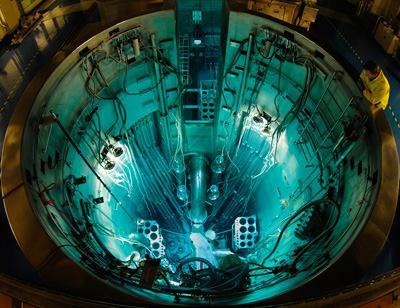ANSTO can play key role in nuclear non-proliferation
Posted By Kim Carr on July 12, 2018 @ 11:10

Most Australians are aware that the nation’s publicly funded research agencies are held in high esteem by the rest of the world.
Fewer people, however, know the extent of global involvement by agencies like CSIRO, the Australian Institute of Marine Science (AIMS) and the Australian Nuclear Science and Technology Organisation (ANSTO).
These agencies don’t only conduct research to increase understanding of the natural environment or to enhance industrial innovation. They also have a diplomatic role. All three provide information that is crucial to sustaining Australia’s international alliances and fulfilling our treaty obligations.
CSIRO’s Deep Space Communications Complex in Canberra and radio telescope in Parkes, for example, have been lynchpins of US–Australian collaboration in space since NASA’s pioneering missions in the 1960s.
AIMS’ CEO, Dr Paul Hardisty, is also involved in the governance of marine research institutes in several other countries. He serves on the International Steering Committee of the Global Ocean Observing System, based in France, and on the advisory boards of the Marine Global Earth Observatories, based in the US, the Red Sea Research Centre in Saudi Arabia, and the Institute of Oceanography of the Chinese Academy of Sciences.
These involvements don’t merely facilitate international cooperation in ocean research; they are a visible expression of the benefits flowing from a rules-based international order.
At a time of increased global anxiety about nuclear weapons proliferation, however, it is ANSTO’s expertise that has the most direct consequences for Australia’s international obligations.
Australia has a longstanding commitment to the non-proliferation of nuclear weapons. Labor governments, in particular, have a proud record in pursuit of that objective.
ANSTO has capabilities ranging from general knowledge of the nuclear fuel cycle to specific expertise in the detection and identification of radioactive materials, including in trace amounts.
The agency is a member of the International Atomic Energy Agency’s Network of Analytical Laboratories, and it supports the IAEA by analysing environmental swipe samples from actual or suspected nuclear facilities around the world.
This participation in the IAEA’s monitoring of potential clandestine nuclear proliferation programs makes ANSTO’s capabilities highly valued and a tangible demonstration of Australia’s commitment to international nuclear non-proliferation objectives.
ANSTO’s internationally respected nuclear forensics laboratory has expertise in isotopic identification and characterisation, allowing the origin of radiological and nuclear material to be determined. This is useful in analysing material from a variety of nuclear fuel cycle activities.
The recent summit between President Donald Trump and North Korean leader Kim Jong-un demonstrates that proliferation of nuclear weapons and illegal programs to develop such weapons remains an urgent concern for the international community to address.
At that meeting, Kim pledged to work towards denuclearisation on the Korean peninsula, though without defining precisely what that would mean or setting a timetable.
Pressure on Pyongyang will have to be maintained, as both the Labor Party and the Coalition government have stated, in the wake of the summit, and noting reports that North Korea has continued to increase its nuclear fuel production.
These developments highlight the fact that in seeking to reduce or remove illegal stockpiles of nuclear weapons and their components, wherever such efforts are undertaken around the world, it isn’t enough to rely on the good faith of relevant state actors.
Programs of disarmament that satisfy the international community require means and systems that provide assurance through verification. And that, in turn, will depend on the nuclear detection capabilities available to the IAEA.
ANSTO’s nuclear fuel cycle research platform has the capacity to analyse activities in nuclear facilities such as those in North Korea, especially research reactors and fuel-fabrication facilities that may have been diverted to military use.
The agency also has extensive engineering expertise in uranium mining and processing, which could be applied to monitor similar operations in North Korea if there’s a requirement to do so.
Given the prevailing global concern of nuclear proliferation, and the existence of illegal nuclear weapons programs such as that of North Korea, the possibility that ANSTO’s capabilities may become more in demand rather than less raises the question of whether Australia’s public science agencies are adequately resourced.
There’s no doubt that the agencies strive to do an excellent job both in increasing Australia’s scientific expertise and in meeting our commitments as a good global citizen.
But it’s also true that since the substantial cuts to the publicly funded research agencies in the 2014 budget, they have lost almost 15% of their workforce.
In other words, they are under pressure to do more with less.
Reinvesting in the agencies would enhance their ability to contribute to the global effort to make the world a safer place.
What better investment in the future could there be?
Article printed from The Strategist: https://aspistrategist.ru
URL to article: /ansto-can-play-key-role-in-nuclear-non-proliferation/
Click here to print.